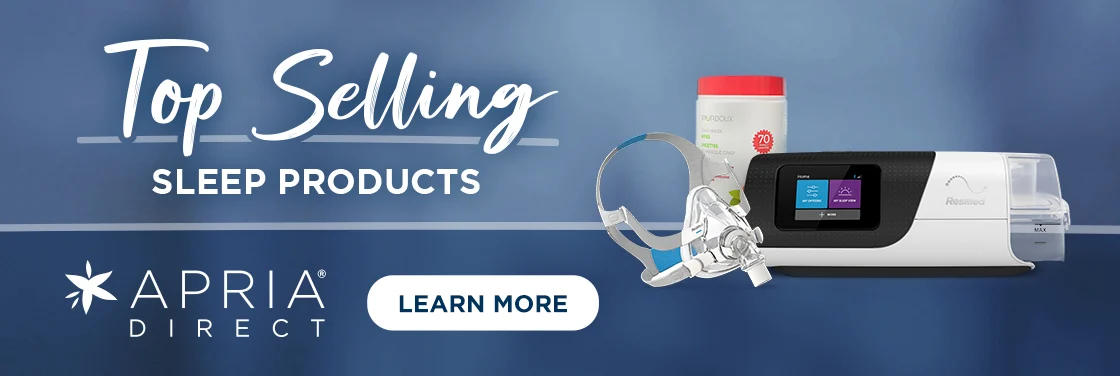Ask Apria
Today's Clinicians

Mary Rehlinger
Mary is a licensed respiratory therapist and has been helping Apria's patients in the Midwest region for over 31 years. In her free time Mary enjoys spending time in the outdoors, teaching group workout classes and watching football.

Carrie Neddenriep
Carrie has been providing clinical support to Apria's patients as a licensed respiratory therapist in the Colorado region for nearly 8 years. Outside of work, Carrie is a sport enthusiast, enjoys spending time with family, and exploring the Rocky Mountains.
CPAP
Q. What is the most common question you hear from our sleep apnea patients?
A. (Mary) The most common question is usually what is new for CPAP (continuous positive airway pressure) masks. If people are doing well with their current mask, I tell them to stick with it because new does not mean better.
If they are struggling or I see a significant leak when I download and review their data, I will either ask them to come in to be re-fitted or use Telehealth to see how they are putting the mask on and determine if we can teach them how to adjust the mask they already have to make it a better fit. Working together, we can see which mask works best for their needs. Patients can all contact our sleep coaches or our sleep supply team (877.265.2426) to ask about a new mask.
A. (Carrie) Someone starting out on CPAP will often ask me how they are supposed to sleep with a mask on. There are all different styles of masks that you can try. The type of sleeper that you are, meaning your position, will play a big role in which mask you might need, but we are here to help you find a mask that works best for you.
Another common question I get is whether or not the patient will be using the CPAP machine for the rest of their lives. The truth is, unfortunately, sleep apnea doesn’t go away. But I can say, once you are using your CPAP machine regularly and you see the incredible benefits that CPAP therapy provides your life, you’ll never want to stop using it!
Q. What are your top three tips for CPAP users to help them get comfortable with their machine so they can be successful with their treatment plan?
A. (Mary) Tip #1: Get a comfortable mask. If your mask is uncomfortable, you are less likely to continue with your treatment. And untreated sleep apnea can lead to serious health consequences such as diabetes, high blood pressure, and heart attack.
Tip #2: If you are new to CPAP, I recommend using your device while watching TV or reading. This will help you get used to the air pressure and mask on your face.
Tip #3: Experiment with the ramp feature of the CPAP device. The ramp feature slowly increases the air pressure so you are less likely to notice it, which may help you fall asleep more quickly.
A. (Carrie) Tip #1: Get used to your mask during the day time instead of just trying to use it at night. Try wearing your mask around the house for a little bit each day to get comfortable with it so that when it comes time to putting it on at night there isn’t such an adjustment.
Tip #2: If there’s an issue, talk to us immediately. Don’t wait to reach out and run the risk of breaking your prescribed treatment. We can help solve issues, so don’t be afraid to reach out to us for help!
Tip #3: Be patient. CPAP takes time. Don’t give up! The benefits are worth the adjustment period, you just need to give yourself some time to acclimate!
Q. What’s something you see patients often forget but that is important to remember?
A. (Mary) Of course, what’s most important is to remember to stick with your treatment as recommended by your care team. Also important is to remember to reorder supplies on a regular basis so there are no interruptions in your therapy. I tell patients to make a note on their calendar. Or even better, sign up for Apria’s Supplies on Schedule, which ensures you have the right supplies right when you need them. Also, it’s important to replace worn-out supplies, which can interfere with your sleep apnea treatment.
A. (Carrie) I would say to remember to check your filter monthly. So much dust gets caught in there and you’re breathing all of that in. The filters are often hidden on the back of the machine so it’s easy for patients to forget to check them. Check them monthly and replace if needed.
Q. As we are in the midst of allergy season, what advice can you offer CPAP users who suffer from seasonal allergies?
A. (Mary) Allergy season can be difficult for CPAP users. Before putting on the mask for the night, use a saline solution to moisten nasal passages. Also, make sure the disposable filters are changed every other week; if you have reusable filters, wash them more frequently. This helps lower the risk of infection.
A. (Carrie) Especially during allergy season, we need to make sure that our CPAP machines and supplies are cleaned properly and regularly. Utilizing your humidifier every night will also help keep your airways from being too dry and making allergy symptoms even worse.
Do you have a question for our Respiratory Therapists to be answered in a future email?
We want to hear from you!


